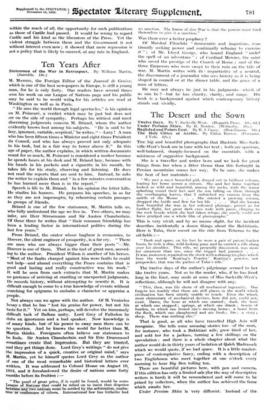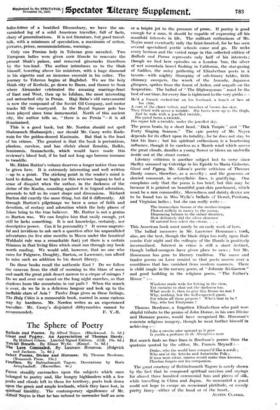The Desert and the Sown
2 Vols. 42s.)
THE big and beautiful photographs that illustrate Miss Sack- ville-West's book are in tune with her text ; both are spacious, well-balanced, sharply-focussed on the essentials, with a mistiness of suggestive background.
She is a traveller and writer born and we look for great things from her when a fitter theme than this fortnight in Persian mountains comes her way. To be sure, she makes the best of her materials :—
" We met a moat beautiful girl, draped out in brilliant colours, leading her horse across a stream: She and her horse together looked so wild and beautiful, among the rocks, with the water splashing round their feet and the sun falling on them through the overhanging leaves, that I unhitched my camera f rem the saddle of the Mouse . . . She uttered a piercing scream, dropped the bridle and flew for her life . . . Had she known how beautiful she was in her coloured plumage, poised as for further flight, her great dark eyes wide with panic, clinging to the rock beside which she had taken refuge, she surely could not have grudged one a whole film of photographs."
This is very vivid, and by no means slight, for the incident describes incidentally a dozen things about the Bakhtiaris. Here is Taha, their escort on the ride from Teheran to the oil-fields :- "Dark and spare, on his feet he wore a pair of patent-leather boots, he rode a slim, wild-looking pony and ho carried a rifle slung over his shoulder. This rifle, we presently discovered, was more for ornament than use, since the trigger had jammed . . . It was, moreover, repaired on the stock with a shining tin plate which bore the words Keating's Powder.' Keating 's powder, not gunpowder, that was the pathos of Taha's rifle."
The twelve days of the author's pilgrimage seemed to her like twelve years. Not so to the reader, who, if he has lived long in the Fast, may smile at some of Miss Sackville-West's reflections, although he will not disagree with any.
" This, then, was life shorn of all mechanical ingenuity. One forgets too readily that there are still places in the world which civilization has been utterly unable to touch. Even the wheel, most elementary of mechanical devices, here did not, could not, exist. Dawn, the hour at which one started ; dusk, the hour at which one stopped; springs, at which one drank ; beasts of burden, to which one bound one's moving home ; a beast from the flock, which one slaughtered and ate fresh ; fire ; a story ; sleep. There was nothing else."
That is good, as all who have travelled High Asia will recognize. She tells some amusing stories too—of the man, for instance, who took a Bakhtiari wife,. grew tired of her, and sold her for a jackass, turning a few shillings on the speculation ; and there is a whole chapter about what the author would do in thirty years of isolation at Qaleh Madrasseli which we would quote, if we had space. It is a little master piece of contemplative fancy, ending with a description of two Englishmen who meet together at one o'clock every morning to hear Big Ben tolling ten.
There are beautiful pictures here, with pen and camera. If this edition has only a limited sale (for the way of descriptive writers is hard) it will be remembered and will come to be prized by collectors, when the author has achieved the fame which awaits her.
Under Persian Skies Is very different. 'Instead -of the belles-lettres of a beatified Bloomsbury, we have the un- varnished log of a solid American traveller,- full- of facts, chary of generalizations. It is not literature, but good travel- talk, with a minimum of speculation, a maximum of action,
pictures, prices, recomniendations, warnings. - .
Only one Persian lady in Teheran goes unveiled. Two European ladies were given carte blanche to renovate the present Shah's palace, and removed gimcracks therefrom by the ton-load. The author introduces us to the Shah himself, towering above his ministers, with a huge diamond in his aigrette and an immense emerald in his collar. The journey to Teheran begins at Baghdad. We see the holy Shiah city of Kerbela; go down to Basra, and thence to Susa where Alexander celebrated the amazing marriage-feast of East and West, then up to Isfahan, the most interesting and untouched city in Persia. Haji Baba's old caravanserai is now the compound of the Soviet Oil Company, and motor trucks fill the courtyard. In the Royal Square polo has been played since time immemorial. North of this ancient city, the author tells us, " there is no Persia "—it is all Russianized.
This is a good book, but Mr. Norden should not spell Shahnameh Shahnanjeh ; nor should Mr. Casey write Kade- wain for the golden-domed Kazimain. But that is the least of his crimes. The greatest is that the book is pretentious, planless, careless, and has cliches about Zenobia, Balkis, Semiramis, Sennacherib, which would have made this reviewer's blood boil, if he had not long ago become immune to twaddle.
Mr.FAdon Rutter's volume deserves a longer notice than can be given here. It is extremely interesting and well written —up to a point. The sticking point in the reader's mind is hard to define, but we begin (or this reviewer began) to feel a sense of disquiet when the author, in the darkness of the shrine of the Kaaba, muzzling against it in feigned adoration, proceeds to tell us its exact shape and dimensions. Richard Burton did exactly the same thing, but did it differently. All through Burton's pilgrimage we have a sense of faith and devotion, of ecstasy and adoration which the holy places of Islam bring to the true believer. Mr. Rutter is not a genius as Burton was. We can forgive him that easily enough, yet stilt 'he lacks something. It is not knowledge, certainly, nor descriptive power. Can it be personality ? It seems ungrate- ful and invidious to ask such a question after his unparalleled adventures (to live nine months in Mecca under the fanatical Wahhabi rule was a remarkable feat) yet there is a certain thitniess in that livingfibre which must run"through any book worth reading, We would add, however, that no one who cares for Palgrave, Doughty, Burton, or Lawrence, can afford to miss such an addition to his desert library.
' Do these books recall the authentic East ? Do we follow the caravan from the chill of morning to the blaze of noon and mark the great pink desert narrow to a cirque of mirages ? Do we nod over our camel on the long night marches, so that shadows loom like mountains in our path ? When the march is over, do we lie in a delicious langour and look up to the ineffable stars of Asia ? Tweke Days gives us these feelings. The Holy Cities is a memorable book, marred in some curious way . by hardness. Mr. Norden writes as an experienced traveller.- Mr. Casey's disjointed dithyrambics cannot be



















































 Previous page
Previous page